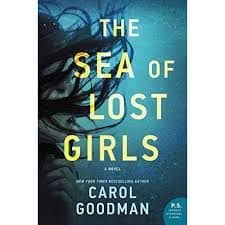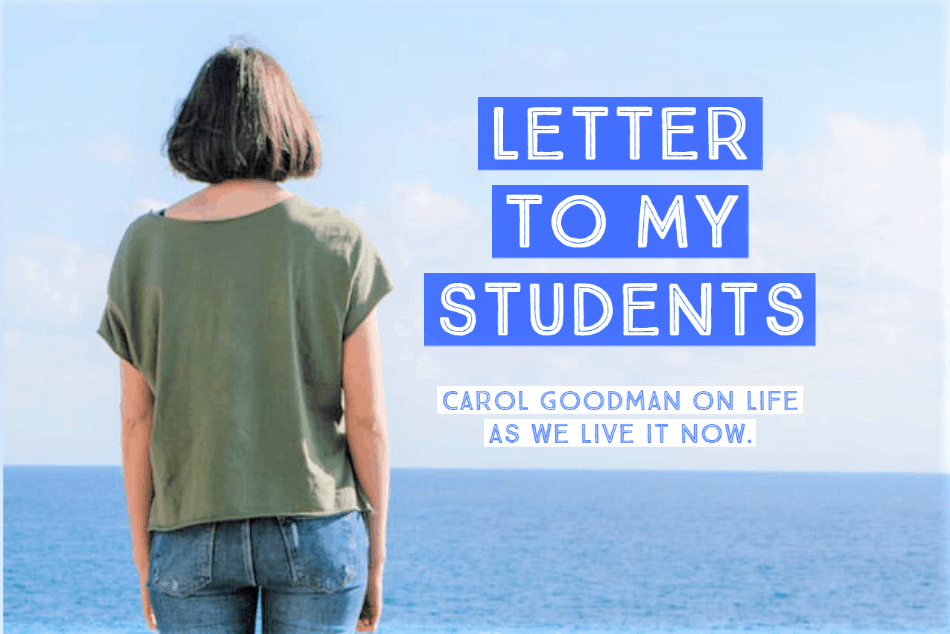Hi Class!
It’s been quite a week. As the number of Covid-19 cases rose the shape of all our lives began to change. From a far off rumbling, the virus has rolled closer, sweeping away plans and engagements, reconfiguring our calendars and sense of personal space. I was going for a wave metaphor there because I’d like to shape this experience into something recognizable—and maybe a little bit pretty—but the truth is that I—none of us—know what the shape of this thing will be. Notice, too, that I had a little trouble with point of view there. This place that I’m writing from is both intensely personal but also feels bigger than myself. Is bigger than myself. It’s also in the middle, while you, class are already in the future, so tense is problematic as well. Remember our discussion about foreshadowing (the mother’s lock of hair in “The Man in the Black Suit” and Faith’s pink ribbon in “Young Goodman Brown”)? How can I foreshadow when I—none of us—know what’s coming?
The week began with emails from the college announcing the closing of our school and the continuation of classes remotely. We learned phrases like “social distancing” and “self-isolating.” We were already preparing for spring break so our plans mingled with thoughts of vacation and freedom, but in suddenly a less fun way. I’d already canceled travel plans and booked events because I have an asthmatic cough that I immediately knew would get me in trouble out in the world. I was disappointed about some of those (and worried about how this would affect the promotion of my new book), but I confess that I was also looking forward to more writing time to work on my novel-in-progress. I wasn’t daunted by the thought of teaching online because I’ve been teaching online writing classes for twenty years. Yes, I love the synergy and excitement of the IRL class discussion and workshop, but there’s also something pure and clarifying about meeting in cyberspace with nothing but our written words to thread the space between us. I planned on saying just that to you, my students, on our last day together.
While I was reconfiguring my calendar and adjusting my syllabi, I stopped by the local supermarket, used the conveniently placed dispenser of Purell wipes to wipe my hands and cart handle, and modestly stocked up on canned goods and pasta, dog food and tuna fish. No panicked hoarding for me! The hand sanitizer shelves were empty but I was not alarmed. Far better to wash my hands with soap and water. I bought extra soap. The store appeared to be out of toilet paper, which seemed odd to me, but I figured I could pick up some next time.
On campus I washed my hands often and used the Purell dispensers when I passed them. I collected papers from my students (you!) and announced we’d be going paperless from now on. I sent texts to my daughter asking how things were in the city.
“The city is so empty, she wrote. It’s wild!
How empty? I wrote back. I’m getting a bad end-times vibe.
It’s fine! she assured me. It’s nice not to have so many crowds.
Sure, pandemics thin out the herd. Everything’s fine!!! I added a maniacally grinning emoji and told her to have a good time and wash her hands.
On Wednesday I had lunch with Photini, the daughter of a friend who goes to Bard College, which is minutes from my house. She complained that Bard wasn’t telling them whether they were going remote or not after spring break.
“I’m a planner,” she said.
I commiserated and told her to let me know if she needed to store her stuff in my garage, as she has done for the last two summers.
I stopped by the supermarket to pick up a few things, add a few cans of beans and soup and tuna fish to the cupboard. Still no toilet paper. When I got home Photini had texted me:
Hi Carol! So basically Bard finally sent out an update and basically told us all to do whatever we want. So Raph and I are going to go home ASAP, probably Sunday. So if it’s still okay to use we would appreciate being able to use your garage. Is that okay for you?
I wrote back that of course that was fine and added. Wow. Bard. My daughter had gone there so I was familiar with some of their President’s laissez-faire style. I relayed this to my daughter, for humor, and added:
Think about coming up here. I’d feel better if you did, but of course it’s up to you.
I added three heart emojis.
She wrote back to say she’d come up if the restaurant where she waitressed closed.
Okay that makes sense, I wrote. Keep in touch.
By the end of the week I was growing more alarmed. New Rochelle (where my step-daughter Nora teaches) was quarantined, there was a reported case in nearby Kingston, and Tom Hanks and Rita Wilson had the virus! I wanted to get my classes done and limit my exposure (my asthmatic cough might put me at greater risk of complications) and talk to Maggie about coming up to the Hudson Valley to self-isolate with me. I woke up early on Friday and wrote long announcements to my students (you) about how our classes would proceed online. I packed disinfectant wipes and hand sanitizer and drove to school, stopping at the Shop Right in New Paltz to check for toilet paper. There was none so I bought a large six-pack of paper towels. Just in case.
You all looked a little dazed in class. One student listed all the things she’d hoped to do during this, her last semester, in college. Another said he planned to come back to the dorms after the spring break because he got more work done here. As I’d planned, I told you all that I’d been teaching online writing class for twenty years and that while I was very sorry not to get to see you all IRL (some of you were generous enough to laugh at that) for the rest of the semester, I was confident we could still have a meaningful experience reading and responding to each other’s writing online.
I told you that writing has the unique power to connect us across space and time.
I told you that writing had gotten me through some rough spots and that I hoped that you, too, could turn to writing to make sense of these chaotic times.
One of you told me that I was the calmest teacher she’d had all day.
A few of you lingered after class to say you really liked the class, the way some students do after the final. As sometimes happens, one of you who had been quiet during the class (I think I once caught you sleeping) came up to say you really liked the class. I love you, Quiet-One-Who-Surprises-Me-Like-This-At-The-End.
It was like the end but not.
On my way home I stopped at my local supermarket to pick up some more cans of soup and beans and cat food and cat litter for Maggie’s cat in case she decided to come up here. Still no toilet paper. I had a polite-but-firm word with the manager who told me they were getting a shipment that night and might have some tomorrow if I came in early. I asked what time they opened and gently admonished the store for not putting a limit on items like toilet paper.
“Oh, we have,” she said, “it’s five.”
“Five?” I gasped. “It should be two!”
“I think so, too,” she said with a shrug and a smile.
I smiled back. Look at me! I’m not a crazy toilet paper-hoarder! One of my students said I was her calmest teacher!
That night I had dinner with friends—yes, we’re still eating out at restaurants but who knows for how long? We talked about our students—their worries and fears—and politics—our worries and fears—and the books we planned to read in our remote time. The Plague by Albert Camus, Jan recommended.
“Or maybe something lighter, like E.F. Benson,” Nancy added.
We elbow-bumped each other in the street, making it into a chicken wing dance and made a date to walk the next day. We were going to get through this together.
At home I texted my daughter a picture of the cat food and litter. She sent me a picture of her cat sitting in a drawer. I complained about the lack of toilet paper and she expressed her astonishment.
Then at three in the morning I awoke in a panic. What was I doing letting my daughter ride the subway in NYC in the middle of a pandemic? What if they quarantined the city? What if she got sick and ran out of food? Would I be able to take care of her? Could I risk getting infected myself when I was much more likely to die from it?
I texted her to call me in the morning and tried to go back to sleep with my usual tricks—plotting my novel-in-progress—but it suddenly seemed flat and irrelevant. I remember how after 911 we writers all wrote about how we couldn’t write anymore because 911 made what we were writing about irrelevant (I don’t have to point out the irony, do I?). Was my novel-in-progress about to become irrelevant? Then what the hell was I going to do with myself during all this remote time?
At 7:30 I put on slippers and a sweatshirt over my pjs and drove to the supermarket. I drove into the rising sun on an empty road that looked like the one in Flannery O’Connor’s “A Good Man is Hard to Find.” When I turned onto the Main Street, though, there were more cars—all, I was sure, coming back from the supermarket with trunks full of toilet paper.
At the supermarket I went straight to the toilet paper aisle and found a half dozen or so packs stranded on nearly empty shelves. I picked up three packs of Cottonelle, but left two, even though I could have taken five. I’m not an animal!
At home I tried to work on my now flat and irrelevant novel-in-progress. It’s set on a college campus so maybe I could mine some of this week’s experiences to infuse it with life. I’d been setting it in the week before Christmas break but I made a quick executive decision to change it to the week before Spring Break, now surely the most poignant season of the college calendar. I have my narrator walking across the empty campus reflecting that it felt as if the campus had been cleared out by a nuclear blast or a pandemic before she remembers it’s just Spring Break.
A bit on the nose; I’ll probably have to edit it out later, but it made me feel a little calmer. Or maybe that was down to my three packs of Cottonelle. I texted Maggie reminding her to call when she woke up. Waited. Called. Got a text saying she’d call when she got out of the shower. Waited. At least she was taking long disinfecting showers. Waited some more. Gave in and called.
I made my argument for coming up here calmly but firmly with interjections of humor—one of my students said I was the calmest teacher she’d seen all day!!!. She listened and then presented her side. She liked the feeling of being among the remaining people on the subway—those of us who can’t work remote—she likes her apartment and her co-workers.
“But what if you get sick?” I asked.
“I bought some cans of soup and my roommate will help.”
“What if I get sick?”
I know it was a low move, but I was doing it for her sake, to make her understand the severity of the situation. I believe I even said: I could die. And then added: But no pressure.
We both laughed at that. She told me she would think about it and we agreed to talk later. I knew I probably had her. She’s stubborn when pushed, but if I gave her time she would see this was the best thing to do.
I finished up a few lackluster pages of my now irrelevant novel and texted with Photini to make arrangements for her and her boyfriend Raph to move stuff into my garage. I drove to Bard, through the peaceful, bucolic campus passing students packing their cars with boxes and lamps and mini-fridges and one guy carrying what looked like a still. Not at all like the campus had been cleared by a pandemic—I’d have to change that—but not quite like Spring Break because who brings home their mini-fridge for Spring Break? And not like the end of the semester, either, because the trees are still bare and it’s too cold. It wasn’t like anything at all; metaphors have failed me.
I elbow-bumped with Photini, who looked like she’d gotten even less sleep the night before than I had, and Raph and a friend named Elijah visiting from San Antonio. We drove back to my house with the first load and then I handed them the keys to my cars and asked them politely to wipe it down with sanitizer wipes when they were done. They enthusiastically agreed. They’re nice kids.
My friends Nancy and Ethel picked me up to go walking. I confessed my 3 am meltdown, making light of my own anxiety and mother hen-ism. They commiserated both with my and Maggie’s points of view. She has her life, they gently pointed out, we wouldn’t have wanted to go back home at her age either. If they thought I was being over protective they were too kind to say so. At Poet’s Walk the lot was full of people enjoying the spring sunshine. At least we have this, we agreed, we can be out in the fresh air, at a safe distance from each other, like those wonderful Italian people singing to each other from their balconies.
Toward the end of the walk Maggie called and my friends walked on ahead to give me privacy. “Okay,” she said, “I’ll come up. I just have to get someone to cover my shifts and talk to my roommate.”
I’d gotten what I wanted, but she sounded miserable.
I could ignore the sound of misery in her voice and have her home with me. For her own safety. So I wouldn’t have to worry as much.
So I wouldn’t have to worry in a pandemic.
“If you want to stay in the city it’s okay,” I said, wondering if someday I would regret those words, knowing this moment would read differently in the future (where you are, my students). Would it be a moment of letting go—of plans and syllabi and outlines and packs of toilet paper—or a fatal mistake? Or both?
I don’t have the shape of the story yet. None of us do. All we have right now are the moments: Italians singing from balconies, chicken wing dances, college students carrying mini fridges. Later we’ll shape these moments into stories. I wrote this to tell you—show you—that I still believe in the power of writing to make sense of the chaos. I want you to have all that and be safe, just as I want my daughter to draw pictures of masked subway riders and have her home with me too. I want you all to write it all down as it’s happening to you now. Don’t worry about what shape it is. You’ll have time to edit and revise.
You’ll have time.
How does a writer write right now? Share your ideas on Facebook.

 Carol Goodman is the author of twenty novels, most recently The Sea of Lost Girls. Among her other outstanding novels are The Lake of Dead Languages and The Seduction of Water, which won the 2003 Hammett Prize, and, under the pseudonym Juliet Dark, The Demon Lover, which Booklist named a top ten science fiction/fantasy book for 2012. Her YA novel, Blythewood, was named a best young adult novel by the American Library Association. Her 2017 suspense thriller The Widow’s House won the Mary Higgins Clark Award. Her books have been translated into sixteen languages. She lives in the Hudson Valley with her family, and teaches writing and literature at The New School and SUNY New Paltz.
Carol Goodman is the author of twenty novels, most recently The Sea of Lost Girls. Among her other outstanding novels are The Lake of Dead Languages and The Seduction of Water, which won the 2003 Hammett Prize, and, under the pseudonym Juliet Dark, The Demon Lover, which Booklist named a top ten science fiction/fantasy book for 2012. Her YA novel, Blythewood, was named a best young adult novel by the American Library Association. Her 2017 suspense thriller The Widow’s House won the Mary Higgins Clark Award. Her books have been translated into sixteen languages. She lives in the Hudson Valley with her family, and teaches writing and literature at The New School and SUNY New Paltz.





